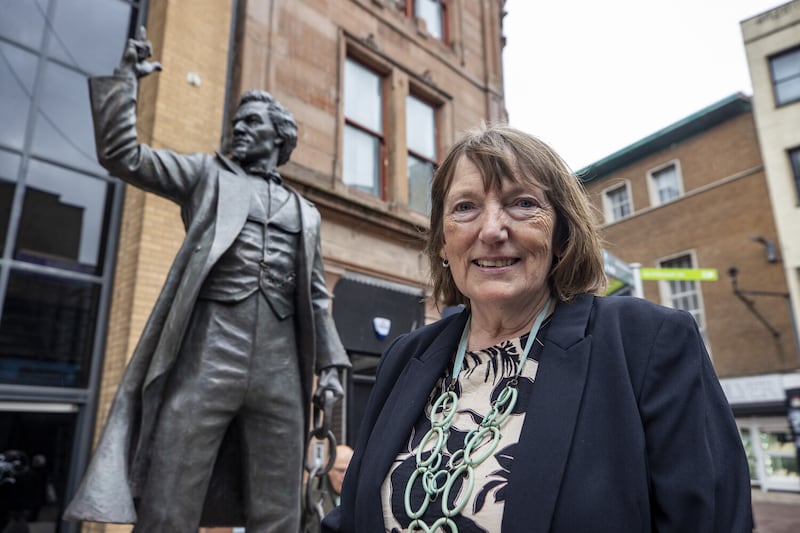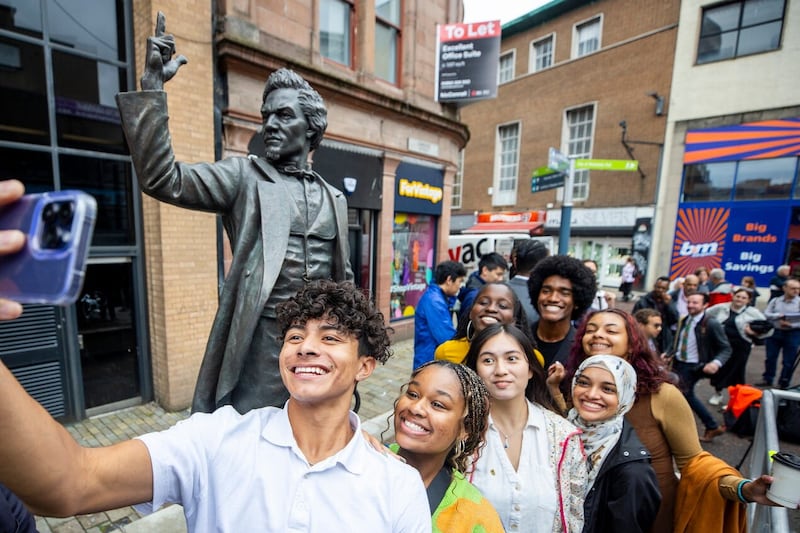Hello to the free men and women of Blufferland, you are all welcome to the Bluffer’s Guide to Irish.
The Bluffer was in Lombard Street in Belfast last week when nochtadh dealbh de Frederick Douglass - a statue was unveiled to Frederick Douglass.
Cé? - Who? I hear you ask and cad chuige? - why?
Well, first of all, the who?
Frederick Douglass was a sclábhaí a scríobh scéal a bheatha - a slave who wrote a narrative of his life which was unusual as most slaves were deliberately kept but illiterate having done so, Douglass feared he would be re-captured and daortha arís chun na sclábhaíochta - condemned again to enslavement.
Even though he had four young children, cuireadh ina luí air - he was persuaded to leave America so he boarded on a ship a sheol trasna an Aigéin Atlantaigh - which sailed the Atlantic Ocean in August 1845, arrived in Liverpool.
Douglass spent two days there before travelling to Dublin where he intended to spend just four days in the home of a Belfast cealaitheoir - an abolitionist who was also a ball de Chumann na gCarad - a Quaker.
The friend had offered to reprint his life story to give Frederick some income while he was ar deoraíocht - in exile.
Frederick felt so welcome in Ireland that he stayed for four months!
In fact, he described being here as being transformative and the happiest moments of his life.
Douglass spoke all over the country and finally, in Belfast – a city with a proud tradition of anti-slavery – he made ten speeches including a few on staonadh ón ól - temperance. His fourth speech was in the Rosemary Street Presbyterian Church near where the statue is located. There he talked passionately about slavery.
Such was his welcome here that he wrote that “whenever else I feel myself to be a stranger. I will remember I have a home in Belfast.”
At the unveling, the great historian Christine Kineally described how the Belfast anti-slavery society hosted a bricfeasta le slan a fhágáil ag Frederick - a breakfast to say farewell to Frederick.
“At the breakfast, they gave him a Bible which he kept for the rest of his life. And it was announced there’s a female Cumann FrithSclabhaíochta Bhéal Feirste - the BelfastAnti-Slavery Society would be formed with Mary and McCracken very much pivotal in that.
Frederick then went to Scotland and in Scotland, he said he was feeling homesick, so he bought himself a violin taught himself to play.
Christine said she wanted to recognize the role of women in the abolition movement. Cheannaigh mná a shaoirse - women purchased his freedom. And finally, in April 1847, he returned to America.
“Frederick never forgot Ireland, and I’m so happy that Ireland never forgot Frederick,” she said.
“And I just want to say to him – as represented in this wonderful statue – welcome home to Belfast.”
You can see the statue of Frederick Douglass at the Rosemary Street end of Lombard Street.
CÚPLA FOCAL
nochtadh dealbh de Frederick Douglass (nawkhtoo jaloo de FD) - a statue was unveiled to Frederick Douglass
Cé? (cay) - Who?
cad chuige? (ca tee) - why?
sclábhaí a scríobh scéal a bheatha (sclaowee a shkreeoo shkayl a vaha) - a slave who wrote his life story
daortha arís chun na sclábhaíochta (deerha areesh hun na sclaoweeakhta) - condemned again to enslavement
cuireadh ina luí air (keroo ina lee er) - he was persuaded
a sheol trasna an Aigéin Atlantaigh (a hawl trasna un ayayn atlantee) - which sailed the Atlantic Ocean
cealaitheoir (kyaleehore) - an abolitionist
ball de Chumann na gCarad (baal de khuman ne garad) - a Quaker.
staonadh ón ól (staynoo own awl) - temperance
ar deoraíocht (er joreeakht) - in exile
bricfeasta le slán a fhágáil ag Frederick (brikfasta le slaan a agaal eg Frederick) - a breakfast to say farewell to Frederick
cumann frithsclabhaíochta (cuman freeh-sclaoweeakhta) - an Anti-Slavery Society
mná a cheannaigh a shaoirse (mraa a kyanee a heersha) - women purchased his freedom






